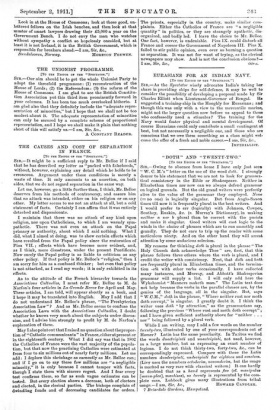THE CAUSES AND COST OF SEPARATION IN FRANCE.
[To THE EDITOR 07 THE "SPECTATOR."]
Sia,—It might be a sufficient reply to Mr. Belloc if I said that he has described my letter as "packed with falsehoods," without, however, explaining any detail which he holds to be erroneous. Argument under these conditions is merely a waste of time. It only amounts to an assertion, on both sides, that we do not regard separation in the same way.
Let me, however, go a little further than, I think, Mr. Belloc deserves from his methods of controversy, and assure him that no attack was intended, either on his religion or on any other. My letter seems to me not an attack at all, but a cold statement of facts. Certainly I can affirm that it was entirely detached and dispassionate.
I maintain that there was no attack of any kind upon religion, nor upon Catholicism, to which I am warmly sym- pathetic. There was not even an attack on the Papal primacy or authority, about which I said nothing. What I did, what I aimed at doing, was to show certain effects which have resulted from the Papal policy since the restoration of Pius VII. ; effects which have become more evident, and, as I think, more disastrous, under the present Pontificate. Now surely the Papal policy is as liable to criticism as any other policy. If that policy is Mr. Belloc's "religion," then I am sorry for him as a confused thinker ; but even that policy is not attacked, as I read my words; it is only exhibited in its effects.
As to the attitude of the French hierarchy towards the Associations Cultuelles, I must refer Mr. Bello° to M. de Narfon's four articles in La Grande Revue for April and May. These articles, I am told, will appear shortly as a book, and I hope it may be translated into English. May I add that I do not understand Mr. Belloc's phrase, "The Presbyterian Association Law" ? And as Mr. Belloc seems to confuse the Association Laws with the Associations Cultuelles, I doubt whether he knows very much about the subjects under discus- sion, and I advise him strongly to profit by M. de Narfon's explanation of them.
May I also point out that I raised no question about the propor- tion of "Catholic communicants" in France, either atpresent or in the eighteenth century. What I did say was that in 1802 the Catholics of France were the vast majority of the popula- tion, but that now the practising Catholics were estimated at from four to six millions out of nearly forty millions. Let me add : I deplore this shrinkage as earnestly as Mr. Belloc can ; and if I go on to say these few millions are "a negligible minority," it is only because I cannot tamper with facts, though I state them with sincere regret. And I fear every test confirms them, so far as such vague estimates can be tested. But every election shows a decrease, both of electors and elected, in the clerical parties. The bishops complain of dwindling funds and of decreasing candidates for orders. The priests, especially in the country, make similar cons- plaints. Either the Catholics of France are "a negligible quantity" in politics, or they are strangely apathetic, dis- organized, and badly led. I leave the choice to Mr. Belloc. One fact, however, is undeniable. Pius IX. could disturb all France and coerce the Government of Napoleon III. Pius X. failed to stir public opinion, even over so burning a question as separation. It was not for want of trying, as the clerical newspapers may show. And is not the conclusion obvious P—. I am, Sir, &c.,






































 Previous page
Previous page